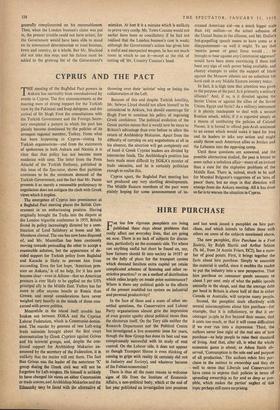CYPRUS AND THE PACT
THE meeting of the Baghdad Pact powers in I Ankara has inevitably been overshadowed by events in Cyprus. The first announcements at the meeting were of strong support for the Turkish view by the Pakistani and Iraqi delegates, and the arrival of Sir Hugh Foot for consultations with the Turkish Government and the Foreign Secre- tary completed a pattern in which the pact has plainly become dominated by the policies of its strongest regional member, Turkey. From what has been happening in Cyprus—rioting by Turkish organisations—and from the statements of spokesmen in both Ankara and Nicosia it is clear that that policy has not become more moderate with time. The letter from the Press Attachd of the Turkish Embassy, published in this issue of the Spectator, shows that partition continues to be the minimum demand of the Turkish Government, and the fact that Mr. Pamir presents it as merely a reasonable preliminary to negotiation does not mitigate the clash with Greek views which it implies.
The emergence of Cyprus into prominence at a Baghdad Pact meeting places the British Gov- ernment in an embarrassing position. Having originally brought the Turks into the dispute at the London tripartite conference in 1955, Britain found its policy increasingly dictated by a com- bination of Lord Salisbury at home and Mr. Menderes abroad. The one has now been disposed of, and Mr. Macmillan has been cautiously moving towards persuading the other to accept a reasonable solution, but the appearance of de- cided support for Turkish policy from Baghdad and Karachi is likely to prevent him from succeeding. Even the last hope, 'American pres- sure on Ankara,' is of no help, for it has now become clear—even in Athens—that no American pressure is ever likely to be applied on the US's principal ally in the Middle East. Turkey has far more to offer anyone hostile to Russia than Greece, and moral considerations have never weighed very heavily in the minds of those con- cerned with power politics.
Meanwhile in the island itself trouble has broken out between EOKA and the Cyprian Labour Federation, which is Communist-domin- ated. The murder by gunmen of two Left-wing trade unionists brought about the first overt demonstration by Greek Cypriots against Grivas and his terrorist groups, and, despite the con- tinued support for Archbishop Makarios an- nounced by the secretary of the Federation, it is unlikely that the matter will rest there. The fact that Grivas was the leader of the notorious 'X' group during the Greek civil war will not be forgotten by Left-wingers. He himself is unlikely to have changed his views on either Communists or trade unions, and Archbishop Makarios and the Ethuarchy, may, be faced with the alternative of
throwing over their 'activist' wing or losing the collaboration of the Left.
Because of this and despite Turkish hostility, Mr. Selwyn Lloyd should not allow himself to be intimidated in Ankara, but should encourage Sir Hugh Foot to continue his policy of regaining Greek confidence. The political evolution of the Greek parties means that it would now be more to Britain's advantage than ever before to allow the return of Archbishop Makarios. Apart from the difficulty of carrying on any negotiations at all in his absence, the situation will get completely out of hand if Greek Cypriot leaders are divided by internecine feuds. The Archbishop's position has been made more difficult by EOKA's murder of trade unionists, and he is certainly politician enough to realise this.
Cyprus apart, the Baghdad Pact meeting has not produced any very startling developments. The Middle Eastern members of the pact were plainly hoping for some announcement of in- creased American aid—on a much bigger scale than £44 million—or the actual adhesion of the United States to the alliance, and Mr. Dulles's hot-gospelling speech seems to have come as a disappointment—as well it might. To say that `mobile power of great force would . . . be brought to bear against any Communist aggressor' would have been more convincing if there had been any sign of such power being available, and clumsy attempts to enlist the support of Islam against the Moscow atheists are no substitute for hard cash in any Middle Eastern country today.
In fact, it is high time that attention was given to the purpose of the pact. Is it primarily a military, alliance? And, if so, is it directed against the Soviet Union or against the allies of the Soviet Union, Egypt and Syria? As a military instrument it is plainly inadequate to deal with a serious Russian attack, while, if it is regarded simply as a means of combating the policies of Colonel Nasser, it is bound to offend pan-Arab sentiment to an extent which would make it hard for Iraq and its leaders to take any action and might easily throw such American allies as Jordan and the Lebanon into the opposing camp.
Until these questions are answered, and the possible alternatives studied, the pact is bound to seem rather a nebulous affair—more of an irritant than a cure for the explosive problems of the Middle East. There is, indeed, much to be said for Marshal Bulganin's suggestion of an 'area of peace' there, but no steps in that direction will emerge from the Ankara meeting. All it has done so far is to worsen the situation in Cyprus.






































 Previous page
Previous page